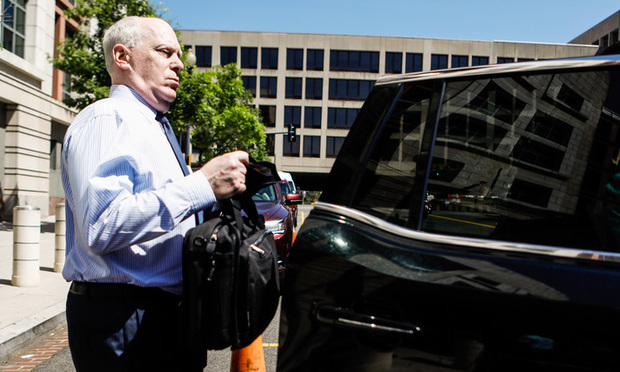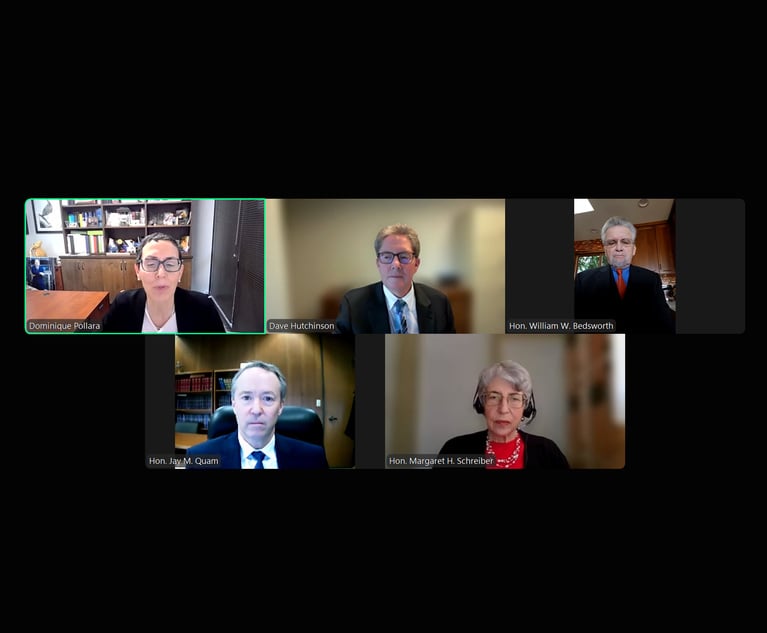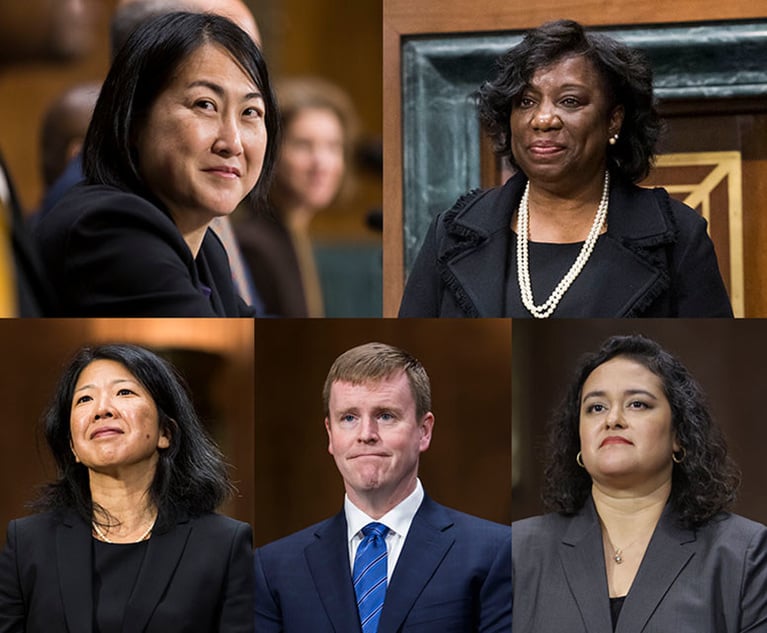Judge Says Skadden's DOJ Deal Is Off-Limits for Russian Company Claiming Mueller Abuses
U.S. District Judge Dabney Friedrich rejected a bid by Concord Management to explore how the Skadden law firm inked a civil settlement over alleged foreign-lobbying violations.
February 13, 2019 at 03:52 PM
4 minute read
The original version of this story was published on National Law Journal
 Eric Dubelier of Reed Smith, a lawyer for Concord Management and Consulting LLC, charged in a special counsel's case, exits federal court in Washington, D.C., on June 15, 2018. Credit: Diego M. Radzinschi / National Law Journal
Eric Dubelier of Reed Smith, a lawyer for Concord Management and Consulting LLC, charged in a special counsel's case, exits federal court in Washington, D.C., on June 15, 2018. Credit: Diego M. Radzinschi / National Law Journal
A federal judge on Wednesday rebuffed a Russian company's claim that it is being selectively prosecuted based on its nationality, rejecting arguments that the U.S. Justice Department's civil settlement with the law firm Skadden, Arps, Slate, Meagher & Flom was evidence of the disparate treatment from prosecutors.
U.S. District Judge Dabney Friedrich, a Trump appointee serving on the trial court since 2017, drew a stark distinction between the criminal accusations the special counsel's office levied against the Russian firm, Concord Management and Consulting, and the civil claims that Skadden had failed in 2012 to properly disclose its work for Ukraine under U.S. lobbying rules.
Concord, represented by a team from Reed Smith, argued the Justice Department had allowed Skadden to “buy its way out of a prosecution” in reaching a settlement that required the firm to pay $4.6 million, the amount it received from the Russia-aligned government of former Ukrainian President Viktor Yanukovych.
Friedrich concluded there was little comparison between the two cases. Concord stands accused of participating in a scheme to interfere in the 2016 presidential election. Skadden, by contrast, was accused of violating the Foreign Agents Registration Act, a 1938 law that requires law firms and lobbyists to report certain advocacy for foreign governments.
“The misconduct ascribed to Skadden in the declination letter is not similar in nature or scope to the conspiracy charged here,” Friedrich wrote in her ruling. “Although Skadden is alleged to have made false and misleading statements to the FARA Unit between 2012 and 2014, the statements were allegedly made by a single former partner of the firm, and there is no allegation that the firm condoned, much less contributed to, the former partner's false and misleading statements.”
Friedrich added: “Significantly, unlike here, there is no claim that the firm engaged in a wide-ranging conspiracy with others to interfere with U.S. political processes and defraud the Federal Election Commission, the Department of State, and the Department of Justice.”
Former Skadden partner Gregory Craig, represented by Zuckerman Spaeder partner William Taylor III, has denied he was required to register his work under the foreign-agent law. Craig reportedly faces a criminal investigation but has not been charged.
Concord's lead defense lawyer, Reed Smith partner Eric Dubelier, has repeatedly pointed to the Skadden settlement in recent weeks as evidence that the Russian company is facing unfair treatment from the U.S. government.
Dubelier, whose colorful rhetoric in previous court filings drew a rebuke from Friedrich, said the Justice Department's settlement with Skadden showed that the law firm had “at a minimum” made false statements to the federal government and conspired to defraud the government.
“And the difference is that Skadden agreed to pay over $4.6 million to the United States so as not to be prosecuted (which is no penalty at all because it simply deprives the firm of its allegedly unlawfully earned revenue), and Concord stands accused of a crime having not been offered the purchase declination option,” Dubelier wrote.
Prosecutors working under the special counsel, Robert Mueller III, said the two cases “are not remotely similar.”
The special counsel's office also praised Skadden for its cooperation. The law firm, prosecutors wrote, “cooperated extensively with the investigation into the matter, and that the law firm has undertaken affirmative steps to enhance its internal procedures and processes.”
Friedrich's order is posted below:
[falcon-embed src="embed_1"]
Read more:
Mueller's Team Touts Skadden's 'Extensive' Cooperation in Foreign-Lobbying Case
Special Counsel Questions How Files in Russia Case Ended Up Online
Registering as a 'Foreign Agent'? Why Law Firms and Lobby Shops Might Demur.
Skadden Registers Ukraine Advocacy After Settling DOJ's Lobbying Case
Reed Smith Team Puts Early Squeeze on Mueller Prosecutors in Russia Case
This content has been archived. It is available through our partners, LexisNexis® and Bloomberg Law.
To view this content, please continue to their sites.
Not a Lexis Subscriber?
Subscribe Now
Not a Bloomberg Law Subscriber?
Subscribe Now
NOT FOR REPRINT
© 2025 ALM Global, LLC, All Rights Reserved. Request academic re-use from www.copyright.com. All other uses, submit a request to [email protected]. For more information visit Asset & Logo Licensing.
You Might Like
View All
‘It's Your Funeral’: Avoiding Doing Damage to Your Client’s Case With Uncivil Behavior

Tips From—and About—the New Judges on the Northern District of California Bench

'The Most Peculiar Federal Court in the Country' Comes to Berkeley Law

Focusing an Economic Lens On the Decrease In Federal Civil Jury Trials
Trending Stories
Who Got The Work
Michael G. Bongiorno, Andrew Scott Dulberg and Elizabeth E. Driscoll from Wilmer Cutler Pickering Hale and Dorr have stepped in to represent Symbotic Inc., an A.I.-enabled technology platform that focuses on increasing supply chain efficiency, and other defendants in a pending shareholder derivative lawsuit. The case, filed Oct. 2 in Massachusetts District Court by the Brown Law Firm on behalf of Stephen Austen, accuses certain officers and directors of misleading investors in regard to Symbotic's potential for margin growth by failing to disclose that the company was not equipped to timely deploy its systems or manage expenses through project delays. The case, assigned to U.S. District Judge Nathaniel M. Gorton, is 1:24-cv-12522, Austen v. Cohen et al.
Who Got The Work
Edmund Polubinski and Marie Killmond of Davis Polk & Wardwell have entered appearances for data platform software development company MongoDB and other defendants in a pending shareholder derivative lawsuit. The action, filed Oct. 7 in New York Southern District Court by the Brown Law Firm, accuses the company's directors and/or officers of falsely expressing confidence in the company’s restructuring of its sales incentive plan and downplaying the severity of decreases in its upfront commitments. The case is 1:24-cv-07594, Roy v. Ittycheria et al.
Who Got The Work
Amy O. Bruchs and Kurt F. Ellison of Michael Best & Friedrich have entered appearances for Epic Systems Corp. in a pending employment discrimination lawsuit. The suit was filed Sept. 7 in Wisconsin Western District Court by Levine Eisberner LLC and Siri & Glimstad on behalf of a project manager who claims that he was wrongfully terminated after applying for a religious exemption to the defendant's COVID-19 vaccine mandate. The case, assigned to U.S. Magistrate Judge Anita Marie Boor, is 3:24-cv-00630, Secker, Nathan v. Epic Systems Corporation.
Who Got The Work
David X. Sullivan, Thomas J. Finn and Gregory A. Hall from McCarter & English have entered appearances for Sunrun Installation Services in a pending civil rights lawsuit. The complaint was filed Sept. 4 in Connecticut District Court by attorney Robert M. Berke on behalf of former employee George Edward Steins, who was arrested and charged with employing an unregistered home improvement salesperson. The complaint alleges that had Sunrun informed the Connecticut Department of Consumer Protection that the plaintiff's employment had ended in 2017 and that he no longer held Sunrun's home improvement contractor license, he would not have been hit with charges, which were dismissed in May 2024. The case, assigned to U.S. District Judge Jeffrey A. Meyer, is 3:24-cv-01423, Steins v. Sunrun, Inc. et al.
Who Got The Work
Greenberg Traurig shareholder Joshua L. Raskin has entered an appearance for boohoo.com UK Ltd. in a pending patent infringement lawsuit. The suit, filed Sept. 3 in Texas Eastern District Court by Rozier Hardt McDonough on behalf of Alto Dynamics, asserts five patents related to an online shopping platform. The case, assigned to U.S. District Judge Rodney Gilstrap, is 2:24-cv-00719, Alto Dynamics, LLC v. boohoo.com UK Limited.
Featured Firms
Law Offices of Gary Martin Hays & Associates, P.C.
(470) 294-1674
Law Offices of Mark E. Salomone
(857) 444-6468
Smith & Hassler
(713) 739-1250






